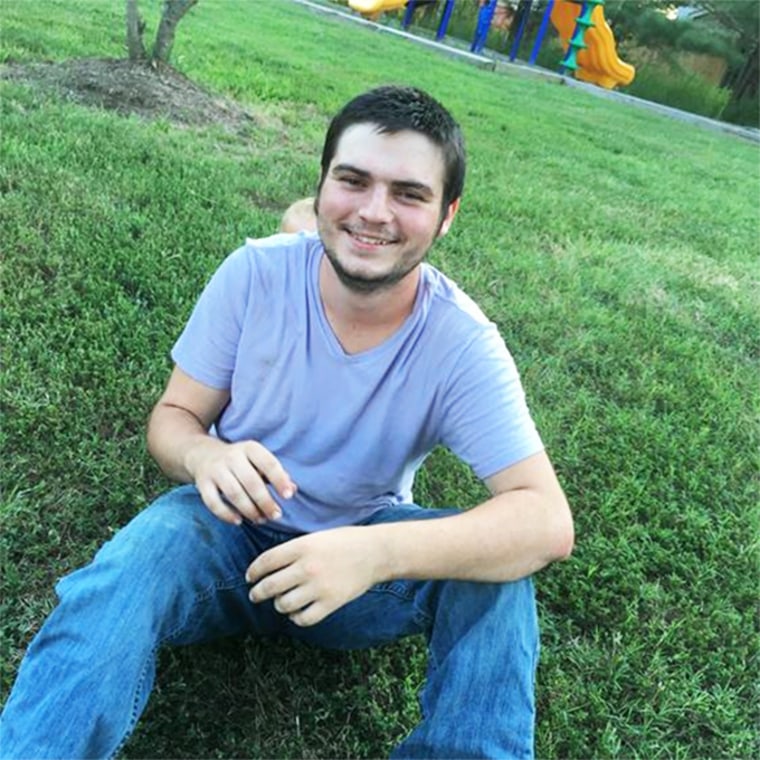The family of a Walmart employee who killed himself after buying a shotgun on his lunch break sued the retailer for wrongful death late Tuesday, alleging that it knew he was considering suicide and was negligent in selling him the weapon.
Jacob Mace, a maintenance worker at a Walmart supercenter in southern Maryland, left the store with the shotgun and ammunition during the break in November 2019 and did not return, according to a lawsuit filed in state court in Prince George’s County. Sheriff’s deputies found him in his truck in a nearby parking lot, the suit says. He was 23.
A few days earlier, Mace's manager and another store employee discussed putting him on a list of people blocked from buying firearms because he had talked about suicide, but they did not follow through with the precaution, according to the suit.
"Jake was kind, caring, and giving," his family said in a statement. "He viewed his mental health struggles as medical issues, actively participated in his treatment, and discussed his issues openly to help end stigma. However, those facts should have prevented his employer from selling him a firearm."
Walmart said it takes the lawsuit seriously and would look into it.
"We are heartbroken when we lose a member of our Walmart family and our thoughts continue to go out to family and loved ones of Jacob Mace," Walmart spokesperson Randy Hargrove said.
"We are committed to being a responsible firearms dealer and take these allegations seriously. Out of respect for everyone involved and because this matter is in litigation, we are not going to discuss the details of this case outside of court."
If you or someone you know is at risk of suicide, please call the National Suicide Prevention Lifeline at 800-273-8255, text TALK to 741741 or visit SpeakingOfSuicide.com/resources for additional resources.
Suicides account for around 60 percent of all gun-related deaths in the United States each year, but as the national debate over guns has flared up in the past few months, it has focused mostly on mass shootings and homicides.
Brady: United Against Gun Violence, a group that favors expanded background checks and other measures to reduce gun violence, is representing Mace's family. It said it believes the lawsuit is the first of its kind against a gun dealer for selling a gun that was used in a suicide since at least 2005, when Congress passed a law aimed at giving retailers immunity from many lawsuits.
"There are misconceptions about suicide. Sometimes, people have this incorrect view that there's nothing you can do to prevent suicides, and that's completely untrue," Jonathan Lowy, chief counsel at Brady, said.
He said if retailers and others did more to prevent people at risk of suicide from getting a gun, fewer attempts would succeed and lives would be saved. Owning a gun is linked to an increased risk of suicide, multiple researchers have found.
"Every gun dealer in every state should exercise great care before they transfer a legal firearm to somebody," Lowy said. A Baltimore law firm, Salsbury Sullivan, is also representing the family.
The past several years have witnessed a new movement to reduce gun suicides by spreading prevention techniques among firearms sellers, bringing together unlikely allies such as public health experts and the gun industry.
In Mace's case, he was also an employee of the dealer that sold him the firearm.
Mace began working at Walmart in St. Mary's County, Maryland, in 2018, and continued working there after he was diagnosed with major depressive disorders and borderline personality disorder the next year, according to the lawsuit.

He began having a mental health crisis in October 2019, leading his family to take away a gun that he previously bought at Walmart, the suit says. He visited a hospital multiple times, missing work.
Mace also told the co-worker — in text messages that the co-worker shared with the manager — that he had "crippling" depression and that he planned to kill himself, according to the lawsuit.
The suit says that the co-worker and the manager discussed placing Mace on a "blacklist" for gun purchases and that the manager said he would "take care of it" but never followed through. Walmart maintains an informal policy of "blacklisting" individuals who should not be sold firearms even if they are not prohibited under state or federal laws, the suit says.
Walmart "had a duty to train and supervise its employees to carefully follow safety protocols designed to screen out potential firearms purchasers showing a risk of harming themselves or others," the lawsuit says.
If not for the company's "negligent training and supervision," Walmart's employees would have refused to sell the shotgun to Mace, it says.
Walmart, the largest U.S. retailer, has a complicated relationship with gun sales. It has long been a major seller of firearms, but in 2019, a gunman authorities said was targeting Latinos opened fire in a Walmart store in El Paso, Texas, killing 23 people. Later that year, Walmart discontinued the sale of some ammunition and weapons and asked its customers not to openly carry firearms in its stores. Some employees have asked Walmart to go further and cease all gun sales.
The lawsuit asks for unspecified damages and an injunction against Walmart to bar unsafe practices in its handling of firearms sales.
"It's important to the family to prevent this from happening to another family," Erin Davis, senior counsel at Brady, said.